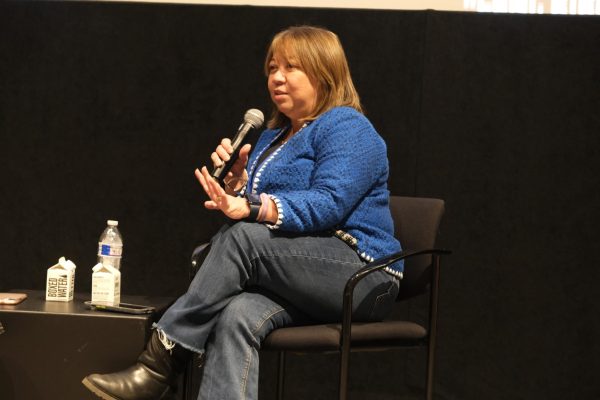“And So It Begins” is not only the dramatic storytelling of a political campaign, but also a cautionary tale of what happens when history is written by the victors. Directed by Ramona Díaz, the documentary is a behind-the-scenes look at former Vice President Leni Robredo during her run for the Philippine presidential elections in 2022.
In the Philippines, Robredo and her supporters can be instantly recognized by their signature color pink, an iconic symbol of her campaign that embodied a sense of hope and unity. However, anyone interested in Philippine politics will know how it ends: Robredo would eventually lose by a landslide to Ferdinand “Bongbong” Marcos Jr., reaching only about half of his 31 million votes.
The result of this election was alarming for a number of reasons. Marcos Jr. (also referred to as BBM) is the son of late dictator Ferdinand Marcos Sr., who imposed martial law in the Philippines for 14 years in the 1970s. According to Amnesty International, 50,000 people were arrested within the span of three years, including labor leaders, church staff, and journalists. The Marcos family amassed a billion-dollar fortune through illicit means, some allegedly through diverting state funds and money laundering, before fleeing into exile in 1986 due to civil and military discontent.
On the other side, Robredo served under former President Rodrigo Duterte and ran a “war on drugs” campaign during his six-year term, which would reveal nationwide extrajudicial killings led by specialized law enforcement, leading to over 12,000 deaths, widespread condemnation by world leaders, and an investigation for human rights violations by the International Criminal Court. Robredo openly opposed the campaign, with Duterte calling her a “scatter-brain” and firing her shortly after being appointed to co-head the anti-drug task force.
Díaz’s documentary proposes several answers as to how, within the span of 50 years, people have changed their minds enough for the Marcos family name to return to the highest level of office. The film recalls the horrors of Marcos Sr.’s martial law and the People’s Power Revolution that led to the self-exile of the Marcos family, leaving behind an infamous legacy. Robredo’s campaign unfolds into a greater story of Philippine history and the people’s fight for democracy.
Besides Robredo, Maria Ressa, CEO of Philippine news outlet Rappler, plays a central role in her preparation to accept the Nobel Peace Prize for her investigative work on corruption in the Philippines. Despite the growing pressure and danger from government prosecution in the Philippines journalism industry, to the point that police raid drills have become the norm for Rappler employees, Ressa represents why truth and transparency must be protected, especially in times of political uncertainties, and even when facts aren’t enough.
Robredo faces Marcos Jr. ‘s tactic of history revisionism, where politicians strategically re-interpret or alter historical events in their favor. The Marcoses, both father and son, deny or refuse to apologize for the human rights abuses and plundered money that happened during the martial law era. To Marcos Jr., that period was the “Golden Age,” a time when the Philippines was at the apex of rapid economic and social growth, and 31 million people believed in his promise of its return, too.
Both Robredo and Ressa were also targets of fake news and attacks by “troll farms,” a modern political weapon that capitalized on manipulating political discourse and public opinion throughout the election campaign. In fact, it had become so widespread that it called for a Senate probe on the issue the year prior. Facebook and TikTok, two of the most popular platforms in the Philippines, had become a tool to spew misinformation. It not only warns us of how the desire for immediate, convenient information has made fake news more accessible than ever but also endangers the legitimacy of any content we consume.
While the 2022 Philippine elections may show these universal challenges that could affect any other nation, there is also a cultural lens that many Filipinos, and even Filipino Americans, could recognize and deeply connect with. With karaoke machines, Catholic church masses, and vibrant region-unique festive costumes, the film celebrates what makes Filipinos, Filipinos.
The importance of community and collectivism, also known as “kapwa” in Tagalog, is an inseparable part of the Philippine identity. The film’s colorful soundtrack shows how Robredo and BBM supporters are brought together by song and dance. From earworm political jingles in the style of pop-synths and church hymnals, to street flash mobs, and even rewriting a Beatles song, it’s a motif throughout the documentary that conveys the togetherness and distinct personality of Filipino culture. On the other hand, the documentary also reflects that Filipinos will have to learn how to navigate political indifferences and falsehoods and make their own choices in a country expected to put their families, community, and elders first.

“And So It Begins” served as a fitting end to the closing night of the Boston Asian American Film Festival, as it resonates with the unity and divisiveness felt ahead of the U.S. presidential election. It tells a story of governance, rhetoric, and corruption that could take place anywhere, and reminds us that the past is closer to us than we think. Díaz’s directorial decision to omit implications of election fraud proved wise, as the film critiques Philippine culture at its core, no matter the results.
Still, as the title suggests, the film does not dread hopelessness and despair, but rather depicts the birth of a movement that believes in a better future. In the film, Anton Carranza, head of a fact-checking internet group backing Robredo, emotionally sums it up, saying, “It’s so hard to love this country.”
As such, it is up to the viewer to decide which ending—or beginning—to believe in.